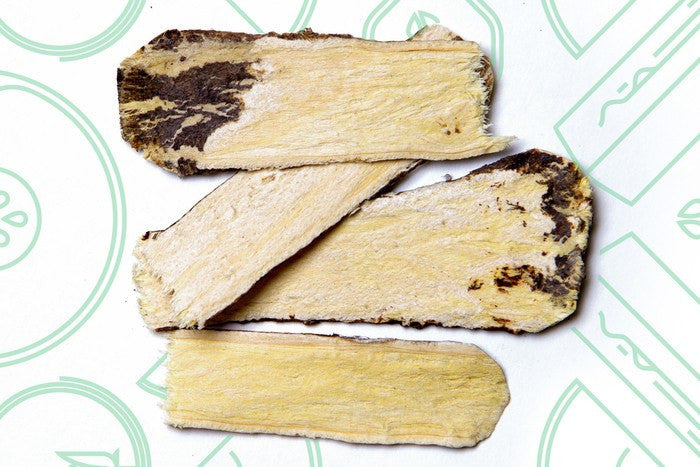A member of the sunflower family, Bai Zhu (Atractylodes Macrocephala) grows naturally in the southeastern provinces of China. For thousands of years, it is highly respected by practitioners of Traditional Chinese Medicine, often referred to as “The First Herb of Invigorating Qi and Strengthening Spleen.”
A key ingredient in many Chinese herbal medicine formulas, including both DAO Labs Immunity Support and Emotional Balance, the root of the Bai Zhu has garnered a powerful reputation over many centuries, for helping maintain a healthy immune response, to helping support a calm and relaxed mood.
Quite the powerful punch for one herb.
An Equivalent of Ginseng
Harvested when the temperature cools slightly in its native habitat, the lightly sweet, lightly bitter Bai Zhu root is grown in the Zhejiang, Hubei and Hunan provinces. Specifically, Bai Zhu that is grown in warm, forested climates around Lin'an City in Zhejiang Province is especially prized within the larger Chinese medicine community.

Bai Zhu ranks high in the pantheon of Chinese herbs and is actually considered by some to be an equal of ginseng (or Ren Shen), easily the most famous Chinese herb in the Western world. An ancient TCM observation is “Ren Shen is in the north and Bai Zhu is in the south,” expressing the importance of these powerful herbs.
The Power of the Spleen
Chinese medicine practitioners and acupuncturists believe Bai Zhu is useful for strengthening the spleen, but this definition of “spleen” differs from the actual spleen in the human body that regulates the production of red blood cells. Instead, according to Chinese medicine theory, "spleen" refers to, in broad terms, the digestive system.
Moreover, a key pillar of Chinese medicine theory is that "digesting" does not just apply to food - as a person is thought to "digest" all information provided by the senses as well. Subsequently, Bai Zhu is thought to not just strengthen the spleen, but help strengthen digestion as well.
Xiao Yao San & Emotional Balance
One of the most well-known traditional Chinese herbal formulas that includes Bai Zhu is called Xiao Yao San. Traditionally, it has been used to support emotional balance, ease occasional tension, and promote a sense of well-being, especially during the menstrual cycle. In fact, the term “Xiao Yao” is related to ideas of wandering or rambling – activities that seem like a beacon of calm in our often overstimulated and stressful world.

“Known as Xiao Yao 'Powder' in Chinese, this formula has a uniquely evocative name that means to wander freely, to ramble, to move unimpeded and unfettered,” notes Dr. Eric Karchmer, Chief Chinese Medicine Officer and DAO Labs Co-Founder. "Many users find this blend supports digestion and a balanced mood."
Invigorating Qi
Chinese herbal medicine theory strongly links Bai Zhu with its consistent ability to invigorate a person’s “Qi”, a crucial element of Chinese medicine that is often loosely translated to “energy” in English, but really encapsulates a whole lot more.

“Qi is more properly a way for speaking about the constant movement and motion that constitutes life,” Dr. Karchmer continues. “In traditional Chinese medicine, it is believed that when the body’s natural flow is disrupted, the Qi may become stagnant, which is thought to result in a variety of imbalances or discomforts.”
A stifled Qi can manifest itself in emotional volatility, according to Chinese medicine theory, meaning that emotions can be exaggerated or unexpectedly unstable. Combined with other herbs in Xiao Yao powder, Bai Zhu is thought to help promote a sense of calm by letting the Qi loose.
Care Consideration: Just a reminder that the above information is not a substitute for medical care and is not a substitute for medical advice or recommendations from a healthcare provider. This information is not intended to treat, mitigate, or cure any disease. That said, we encourage you to connect with an Acupuncturist in your community to learn more about this and other Traditional Chinese Medicine options. If you’ve got questions about Chinese herbal medicine or getting started with an Acupuncturist, feel free to connect with us at hello@mydaolabs.com.












,_LAc_96x96.jpg?v=114829)



